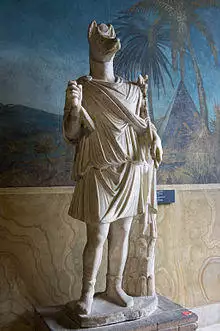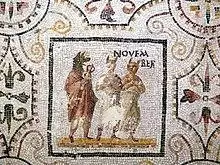
In classical mythology, Hermanubis (Ancient Greek: Ἑρμανοῦβις, romanized: Hermanoubis) was a god who combined Hermes (Greek mythology) with Anubis (Egyptian mythology).
Hermes' and Anubis's similar responsibilities (they were both conductors of souls) led to the god Hermanubis. He was popular during the period of Roman domination over Egypt. Depicted having a human body and a jackal head, with the sacred caduceus that belonged to the Greek god Hermes, he represented the Egyptian priesthood. He engaged in the investigation of truth.[2][3]
The divine name Ἑρμανοῦβις is known from a handful of epigraphic and literary sources, mostly of the Roman period. Plutarch cites the name as a designation of Anubis in his underworldly aspect, while Porphyry refers to Hermanubis as σύνθετος "composite" and μιξέλλην "half-Greek".[4]
Although it was not common in traditional Greek religion to combine the names of two gods in this manner, the double determination of Hermanubis has some formal parallels in the earlier period. The most obvious is the god Hermaphroditus, attested from the fourth century BC onwards, but his name implies the paradoxical union of two different gods (Hermes and Aphrodite) rather than an assimilation in the manner of Hermanubis.
The god appears in the November panel of the mosaic calendar from Sousse, Tunisia.
See also
- Serapis
- Osiris-Dionysus
- Religious syncretism
- Greeks in Egypt
- Egyptian pantheon
- Ancient Egyptian religion
- Ancient Greek religion
References
Notes
- ^ Statue of the god Anubis, Vatican Museums
- ^ Plutarch, De Iside et Osiride 61
- ^ Diodorus, Bibliotheca historica i.18, 87
- ^ Porphyry, De imaginibus fr. 8, p. 18. 1–2 Bidez
Bibliography
- A history of Egypt Under Roman Rule by Joseph Grafton Milne (1992) p. 195
- Who's Who in Egyptian Mythology by Anthony S. Mercatante (2002) p. 56
- The Gods of the Egyptians, or, Studies in Egyptian mythology by E. A. Wallis Budge (1904) p. 265
Sources
 This article incorporates text from a publication now in the public domain: Smith, William, ed. (1870). "Hermanubis". Dictionary of Greek and Roman Biography and Mythology.
This article incorporates text from a publication now in the public domain: Smith, William, ed. (1870). "Hermanubis". Dictionary of Greek and Roman Biography and Mythology.
External links
- The Onomastic Evidence for the God Hermanubis by Amin Benaissa
- Harry Thurston Peck, Harpers Dictionary of Classical Antiquities (1898), Perseus Project
- Statue of Hermanubis (Alexandria, early 2nd century CE), Antiquities Museum of Bibliotheca Alexandrina
